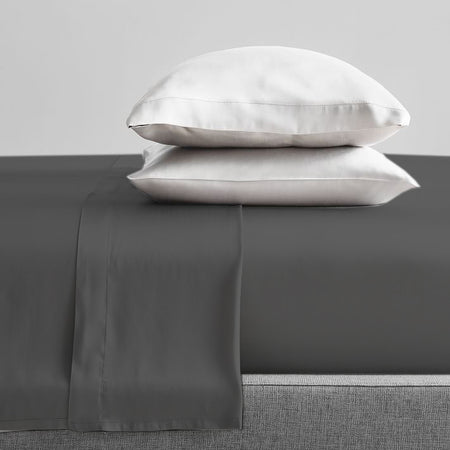Sleep deprivation means regularly getting less rest than your body needs. It can be caused by stress, hectic schedules, medical problems, or simply sleeping on an old, uncomfortable bed. Poor sleep patterns over time can confuse your nervous system and reduce the amount of sleep your body gets, even if you spend hours in bed. Over time, being sleep-deprived takes a heavy toll on your body and mind.
In the US, about one in three adults gets less than seven hours of sleep a night, and around 50 to 70 million people struggle with sleep disorders, according to the National Heart, Lung, and Blood Institute. Sleep deprivation can be either short-term (lasting a few days) or chronic (lasting weeks or longer).
Common Signs of Sleep Deprivation

If you are not getting enough rest, you might experience one or more of the following signs:
-
Excessive fatigue during the day, feeling sleepy, or dragging through the day
-
Poor concentration or memory lapses; tasks that once felt effortless now require more effort to focus on.
-
Mood changes, irritability, stress, and feelings of increased anxiety or depression.
-
Slower reflexes and poor coordination: simple actions are delayed or clumsy.
-
Frequent yawning and eye rubbing, a constant feeling of grogginess.
-
Difficulty in thinking, trouble sleeping through the night, and poor decision-making.
-
Unplanned sleep episodes (microsleeps or the urge to take a nap suddenly).
-
Lower mental health from increased anxiety or depression, as explained by the Sleep Foundation
-
Poor judgment and reduced alertness, more mistakes at work, or accidents on the road
-
Weak immunity, making you susceptible to common colds or infections
-
Weight gain or appetite changes—hormones that regulate hunger can become imbalanced.
These symptoms typically improve with sufficient rest. But if they persist, it might be a good idea to consult with your doctor so they can rule out any underlying issues like substance abuse, mental health, etc., that tend to overlap with sleep disorders.
Long-Term Health Effects of Sleep Deprivation
Over time, lack of quality rest can lead to trouble concentrating, forgetfulness, and a higher risk of cognitive issues like dementia. Your mood also takes a hit. Sleep is essential for emotional balance, and without it, you're more likely to experience irritability, anxiety, and even depression. As your mental clarity drops, so does your ability to handle stress, make decisions, and stay motivated throughout the day.

Your body feels the effects, too. When you consistently miss out on rest, your immune system weakens, leaving you more vulnerable to illnesses and slower to recover. Your heart has to work harder, increasing the risk of high blood pressure, stroke, and heart disease (cardiovascular disease).
Hormones that regulate hunger and stress become imbalanced, leading to weight gain, increased cravings, and even insulin resistance. Over time, the risk of developing chronic conditions like type 2 diabetes, obesity, heart attack and certain cancers goes up.
Even the way you look can change. Your skin relies on sleep to repair itself, so without enough rest, it begins to show signs of aging such as dullness, dark circles, and fine lines. Additionally, your energy, creativity, and productivity noticeably decline, making everyday tasks feel more challenging than they should be.
The good news? It’s never too late to build better sleep habits. With a consistent routine and a little intention, you can give your brain and body the deep rest they’ve been asking for—and feel better from the inside out.
How Your Mattress Contributes to Sleep Deprivation
A sagging, unsupportive mattress can exacerbate your sleep struggles. When it stops cushioning your pressure points and fails to keep your spine aligned, you’re left tossing and turning, waking up with aches and pains, or feeling tired all day. These discomforts don’t just ruin your night; they may also trigger insomnia symptoms and make restless leg syndrome even more difficult to manage. It may be time to consider a mattress that truly supports your body and helps you sleep better.
Investing in a modern, supportive mattress can significantly improve your sleep quality. For example, options like the Family Bed 10-Foot Gel Memory Foam Mattress, designed with cooling gel layers and high-density support foam for comfort and spinal alignment, and the Taylor & Wells Baltic Breeze Plush, which combines plush comfort with advanced support technology for restful sleep.
Simple steps, such as flipping or rotating your mattress, using a supportive pillow, and keeping your bedroom cool, dark, and quiet, also help maintain your mattress and stabilize your sleep. If you’re struggling with poor sleep, checking your mattress might be a smart first step toward better rest.

How Sleep Deprivation Is Diagnosed
If your symptoms don’t improve, try keeping a sleep journal for 1 to 2 weeks. Write down when you go to bed when you wake up, and how you feel each day. Tracking your sleep helps you and your doctor identify patterns or habits that may be affecting your rest, such as caffeine consumption late in the evening or screen use before bed.
If necessary, a doctor or sleep specialist may conduct a physical examination or recommend a sleep study to evaluate the condition further. These studies typically occur overnight and monitor your breathing, brain waves, heart rate, and other bodily functions to help diagnose underlying sleep problems, such as sleep apnea, insomnia, or other health issues that disrupt your sleep.
Since chronic sleep deprivation symptoms can overlap with other health conditions, getting a professional diagnosis is important. If simple changes, such as going to bed earlier, reducing screen time, or avoiding late-night snacks, don’t help, consider consulting a healthcare provider for further advice.
Treatment Options For Sleep Deprivation
A solid approach to addressing your lack of sleep begins with good sleep hygiene, which involves small daily habits that improve sleep quality.
Stick to a routine
Go to bed and wake up at the same time every day, including weekends. This reinforces your body’s circadian rhythm (or natural sleep schedule).
Create a calming bedtime ritual.
Wind down before bed with a book, soft music, or a warm bath. Avoid screens and work for at least an hour before sleep.
Limit stimulants and alcohol.
Cut off caffeine by late afternoon. Don’t smoke before bed, avoid heavy meals, and avoid alcohol at night.
Optimize your sleep environment.
Keep the bedroom dark, cool, and quiet, and use comfortable bedding and pillows to ensure a restful night's sleep. A supportive, high-quality mattress can also make a significant difference in the quality of your sleep each night.
Use naps wisely
Short naps under 30 minutes can boost alertness without ruining nighttime sleep. Try not to nap late in the afternoon.
If your sleep issues are related to a medical condition, treatment should be more targeted. CPAP machines help manage sleep apnea, while medication or iron supplements can help with restless leg syndrome. Therapy like Cognitive Behavioral Therapy for Insomnia (CBT-I) is also proven to break patterns of sleep-related worry and overthinking.
What’s Standing Between You and Better Sleep?
Improving your sleep can significantly impact how you feel each day. Take a moment to check your sleep setup. If it no longer gives you the comfort and support you need, it may be time for a change. Bedding Mart offers a variety of options to help you rest better. Explore our mattress collection and find what feels right for you.






















